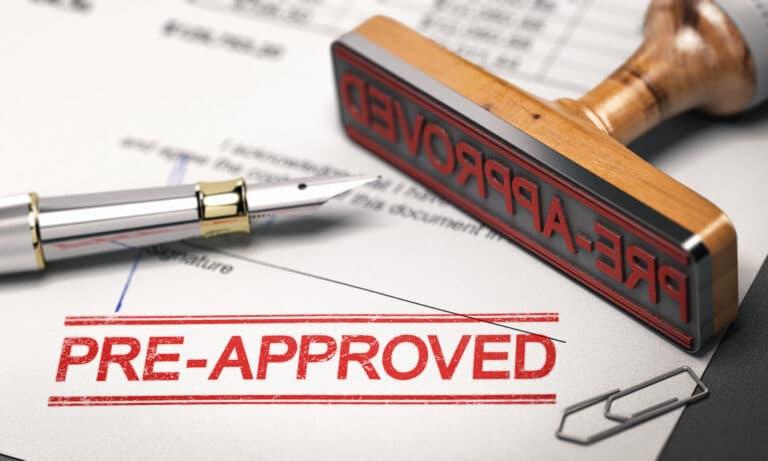
When you don’t know how much you can afford, it might be tough to shop for a house. With a pre-approval for a mortgage, you may shop more effectively and make better offers. Let’s take a look at what preapproval entails and how to get started.
What is the Definition of Mortgage Pre Approval?
Pre-approval is the process of finding out how much money you can borrow to buy a house. Loans are based on a person’s income, assets, and credit score.
Prequalification vs. Preapproval
Preapproval and prequalification are both methods of determining how much you’ll be able to borrow. Although some lenders use these terms interchangeably, there are some minor differences between these two processes.
A mortgage prequalification is similar to a preapproval, but it may be less precise. With a prequalification, you won’t have to provide as much financial information, and your lender will not pull your credit.
Your lender can only provide you with estimates if you do not have a credit report. This means that as the lender gathers more information, the approval amount, loan program, and interest rate may change. At this point in the prequalification process, you don’t have to produce any financial documentation (such as bank statements or pay stubs).
Preapprovals are more comprehensive than prequalifications. When pre-approved, you may be asked to show proof of income and funds used to acquire the loan. A hard credit check will also be required as part of the preapproval process so that your lender can obtain your credit score and determine how much other debt you have.
Approval vs. Pre Approval
A preapproval is useful when looking for a home, but once you find your dream home, you’ll need to get a full approval, and simply getting a preapproval does not guarantee you’ll be approved. This process includes ensuring that the property details are correct for your lender.
Here are a few property specifics that your lender must approve:
- Your lender will request an appraisal to verify you are not paying more than the home is worth. A lower appraisal may cause complications with your loan.
- The title: Your lender will work with a title company to determine who owns the property and to ensure that no claims or liens are filed against it.
- The condition of the home: Some loans require that the property meet certain criteria before the loan can be closed. For example, if you’re using an FHA loan to buy a home, things like cracked windows, missing handrails, or a leaking roof could prevent the loan from closing.
How to Get a Mortgage Pre Approval
Before you get pre-approved for a home loan, work with your lender to confirm your financial information and get a loan estimate. Let’s go over each step and review which parts of the process you’ll be in charge of.
Gather Your Documentation
The preapproval process is similar to filling out a mortgage application. This means that your lender or loan officer will want to examine your finances thoroughly. Make sure you’re prepared with the following:
- Income documentation
- Verification of employment
- Asset verification
- History of credit
- Identification
- Debt-to-income ratio (DTI)
You’ll need the necessary documentation before beginning the preapproval process to ensure everything goes smoothly. Here are a few things to include on your mortgage preapproval checklist:
- W-2 declarations
- Paycheck stubs
- Account statements
- License
- Number of Social Security
Once you’ve submitted all of your information to the lender, you should receive your loan estimate within three business days, though this may be much faster if you use an online mortgage lender. Pre Approval status and pre approval amount can be found in the loan estimate.
When Should You Get Pre-Approved?
Pre Approval is useful for more than just your lender. Knowing how much mortgage you can expect might help you focus on your best buying options.
That means the best time to get preapproved is at the beginning of your home-buying process. If you’re ready to buy a new home, apply for pre-approval now to learn more about your mortgage possibilities and show agents you’re serious.
Examine Your Credit Score
Pre Approval usually necessitates a hard credit inquiry. While this may cause your credit score to fall slightly, it will not have a significant impact on your credit. Subsequent inquiries from other mortgage lenders within the same time period (typically 45 days) will have no effect on your credit score.
Get a Letter of Preapproval for a Mortgage
When you are preapproved, you will typically receive a preapproval letter. There are several reasons why a preapproval letter is necessary. First and foremost, real estate agents will typically request to see your pre approval letter before showing you houses. This ensures that they do not waste time showing you homes that are out of your price range.
Second, when you make an offer on a home, you can share the preapproval letter with the seller. It demonstrates that you will have no trouble obtaining financing for the amount you are offering.
Learn How Long Pre Approval Lasts
Pre Approval does not last indefinitely. Check your expiration date and keep it in mind when looking at houses. Pre Approval is typically valid for 60 – 90 days, though this varies by lender. Without a home, you can renew your mortgage by giving your lender your most recent financial and credit information.